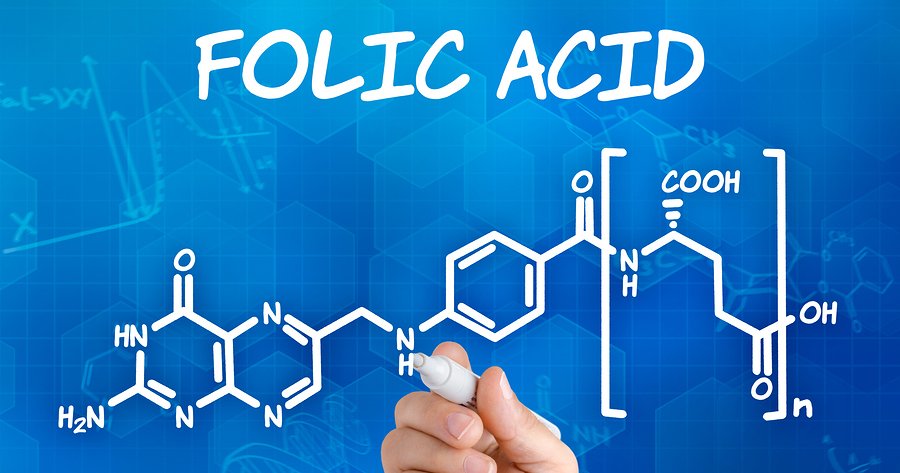Becoming pregnant is an incredibly special time in the lives of most couples, so we do all that we can to nurture and take care of our babies-to-be. We make regular prenatal visits to the obstetrician, eat nutritious meals, and take vitamins and supplements to ensure that the baby has everything he or she needs to develop properly. Your doctor will likely prescribe a multivitamin containing the recommended daily amount of folic acid, since taking that before conception and during pregnancy greatly lowers the risk of certain neural tube defects such as spina bifida and anencephaly. But now new research suggests that consuming too much folic acid may be to the detriment of our children as they get older. Well, as Jon Barron always says, “Too much of any healthy thing is bad.”
The study, which took place at the University of Porto and the Catholic University of Portugal, found that women who have an excessive intake of folic acid during gestation may give birth to daughters who are at an elevated risk of developing diabetes and obesity as adults.1 “Taking too much folic acid while pregnant may put daughters at risk of diabetes and obesity.” Science Daily. 10 February 2015. Accessed 17 February 2015. http://www.sciencedaily.com/releases/2015/02/150210083651.htm Instead of using human subjects, the scientists performed the experiment on laboratory rats.
During their mating period, throughout pregnancy, and while lactating, the rats were given doses of folic acid that were 20 times higher than the recommended daily amount. Their offspring appeared typical at birth, but when they reached adulthood, certain issues began to set them apart from other rats. They were more likely to be overweight, develop insulin resistance, and display irregular feeding behavior.
These rats were also found to be deficient in adiponectin, which is a hormone that is involved in certain metabolic processes such as the regulation of glucose and fatty acid levels. When present in the proper quantities, it helps offer protection from both diabetes and obesity, and that might explain why these were common problems among the offspring. And while the majority of the offspring developed these health issues, they were considerably more prominent among the females.
In contrast, a control group of rats that were fed the recommended daily amount of folic acid produced offspring that typically were healthy after reaching adulthood. Since the only factor that was altered between the groups of rats was the quantity of folic acid provided, this trial offers some pretty strong evidence of the conditions that may be associated with excessive folic acid intake. However, that being said, we do need to keep in mind that the study participants were rats, not people. Their bodily systems are not exactly like ours, and therefore the outcomes of research on them cannot necessarily be translated to an equal effect in humans.
As for the quantities of folic acid provided to the rats, 20 times the recommended amount may seem like a ridiculously high level that likely would not be realistic for a woman to consume ever, much less daily. However, it might be much easier than you would think for a person’s total intake to add up quickly. The recommended daily amount of folic acid for humans is 400 to 800 mcg during pregnancy. But women with a family history of spina bifida may be prescribed a 4,000-mcg dose of folic acid. Add to that the folic acid found in fortified breakfast cereals, breads, and pasta, and you can begin to see that it is possible a person could significantly overdo their intake of this B vitamin without realizing it–although hitting 20 times the recommended dose still seems a bit of a stretch.
The bottom line is that folic acid is definitely important to consume prior to and during pregnancy, and there is no disputing its value in helping to prevent neural tube defects in babies. However, it is probably smart for women to keep track of their total folic acid intake during pregnancy just in case. Try to stay fairly close to the recommended daily amount, and if that means cutting back on some of the grain products that offer folic acid fortification, so be it. Although going two to three times the recommended daily dose is probably not a problem, it’s still better to err on the side of caution than to risk possibly elevating the chance of your child developing diabetes and serious weight problems as she grows up.
Addendum:
Some readers have expressed concern that this article doesn’t differentiate between folic acid and folate, which many people believe is the natural form of the vitamin.
Jon Barron has made clear on numerous occasions that when it comes to vitamins, he always recommends natural over synthetic. For example. That said, there are two things to keep in mind.
First, the vast majority of people take synthetic folic acid supplements. This study is relevant to them, which is why we reported on it. Our site has hundreds of thousands of readers from all over the world—and at many different levels of alternative health involvement. We need to address the concerns of all of our readers, not just the purists.
That said, there is a bigger problem with the expressed concerns. Unlike the terms that differentiate between natural and synthetic vitamin E (d-alpha vs dl-alpha) and natural and synthetic vitamin D (D3 vs D2), which are actually recognized by science, the differentiation between the terms folate and folic acid, is not recognized by the scientific community. It is a differentiation created by the marketers of supplements. Understand, we’re not saying that natural and synthetic folic acid are the same, just that the terminology is not based in science.
Food supplement manufacturers often use the term folate for something different than “pure” folic acid: in chemistry, with folate referring to the deprotonated ion and folic acid to the neutral molecule. Note: both these forms co-exist in water. The International Union of Pure and Applied Chemistry and the International Union of Biochemistry and Molecular Biology state that folate and folic acid are the preferred synonyms for pteroylglutamate and pteroylglutamic acid, respectively.
Even though the food industry often uses folate to mean the naturally occurring form of folic acid, according to the scientific community, the two terms can be used interchangeably. In fact, what purists call folate, Is actually not a single substance, but rather, a collection of “folates” that is not chemically well-characterized and that includes other members of the family of pteroylglutamates, or mixtures of them, having various levels of reduction of the pteridine ring, one-carbon substitutions, and different numbers of glutamate residues, all of which occur in nature.
Bottom line: trying to differentiate between the use of the words folate and folic acid is not based on science, but on marketing. It is more accurate to refer to differences between natural and synthetic folic acid—or natural and synthetic folate.
Hope that helps.
References
| ↑1 | “Taking too much folic acid while pregnant may put daughters at risk of diabetes and obesity.” Science Daily. 10 February 2015. Accessed 17 February 2015. http://www.sciencedaily.com/releases/2015/02/150210083651.htm |
|---|












perhaps an over methylation
perhaps an over methylation of a gene related to the production of adiponectin? Mice with an under methylation problem causing an over expression of the agouti gene were obese and prone to diabetes. Supplementing with adequate methyl donors such as methyl folate caused the offspring to be normal. So it looks like balance is very important.
Hi Jon
Hi Jon
I would have found this much more useful if you had included info on folate as well, and why the latter is better.
Please see our response below
Please see our response below…
This article is very
This article is very misleading and incorrect. There is a huge difference between naturally occurring FOLATE and synthetic folic acid. No one should be taking folic acid, only folate. The study used folic acid. Pregnant women should only be consuming folate, never folic acid. For example, studies show women who take folic acid during pregnancy rather than folate have twice the risk of breast cancer later in life. I certainly agree that too much folate can be taken and may cause harm, but this study does not show that and the two forms need to be distinguished.
For you to bring up this study is sort of like saying the study that showed that dl-alpha-tocopherol caused harm means all vitamin E is bad, which is totally incorrect. dl-apha-tocopherol is derived from coal tar and is useless and toxic, where as naturally occurring d-alpha-tocopherol is healthy and not toxic (if too much is not taken).
You should follow up on this article with the differences between folic acid and folate.
Your sentiment is appreciated
Your sentiment is appreciated, and Jon has made clear on numerous occasions that when it comes to vitamins, he always recommends natural over synthetic. For example. That said, there are two things to keep in mind.
First, the vast majority of people take synthetic folic acid supplements. This study is relevant to them, which is why we reported on it. Our site has hundreds of thousands of readers from all over the world—and at many different levels of alternative health involvement. We need to address the concerns of all of our readers, not just the purists.
That said, there is a bigger problem with your concerns. Unlike the terms that differentiate between natural and synthetic vitamin E (d-alpha vs dl-alpha) and natural and synthetic vitamin D (D3 vs D2), which are actually recognized by science, the differentiation between the terms folate and folic acid, is not recognized by the scientific community. It is a differentiation created by the marketers of supplements. Understand, we’re not saying that natural and synthetic folic acid are the same, just that the terminology you are insisting on is not based in science.
Food supplement manufacturers often use the term folate for something different than “pure” folic acid: in chemistry, with folate referring to the deprotonated ion and folic acid to the neutral molecule. Note: both these forms co-exist in water. The International Union of Pure and Applied Chemistry and the International Union of Biochemistry and Molecular Biology state that folate and folic acid are the preferred synonyms for pteroylglutamate and pteroylglutamic acid, respectively.
Even though the food industry often uses folate to mean the naturally occurring form of folic acid, according to the scientific community, the two terms can be used interchangeably. In fact, what purists call folate, Is actually not a single substance, but rather, a collection of “folates” that is not chemically well-characterized and that includes other members of the family of pteroylglutamates, or mixtures of them, having various levels of reduction of the pteridine ring, one-carbon substitutions, and different numbers of glutamate residues, all of which occur in nature.
Bottom line: trying to differentiate between the use of the words folate and folic acid is not based on science, but on marketing. It is more accurate to refer to differences between natural and synthetic folic acid—or natural and synthetic folate.
Hope that helps.
Thanks for your reply. I
Thanks for your reply. I understand where you are coming from with lots of readers who take folic acid. But, those readers should know there is a difference between natural folate and synthetic folic acid and the difference can be huge for some people. In my opinion, any discussion on folic acid should compare the two. The FDA is in fact trying to remove folate from supplements and leave only folic acid – so it becomes all the more important to distinguish the two and although i know they are used interchangeably by scientists/supplements, it needs to change and NOT be treated synonymously. It is the responsibility of those who realize there is a difference to tell others (like yourselves)
The folate I am talking about is the active form in the body 5-Methyltetrahydrofolic acid which people with the MTHFR genetic variation cannot convert folic acid into very well. This is a large percentage of people. So for you to advocate folic acid intake as you do in this article without mentioning folate will certainly lead some astray into folic acid supplementation that will do them little good and may cause harm because synthetic folic acid can clog up folate receptors leaving a severe deficiency in this very important vitamin.
Moreover, it would be very good to mention the relationship between folate and B12. A deficiency in one can lead to a deficiency in the other. So even if a person takes folate they can be deficient in folate if they are deficient in B12 to begin with.
Other forms of folate that are good: whole food or probiotic source, methyl folate, folinic acid or calcium folinate are all effective. I prefer the active form: 5-Methyltetrahydrofolic acid.
I dont mean to be negative, I soooo appreciate everything that you all do and Jon Barron, but felt this article could easily lead people astray into something that could cause harm. It is especially important for pregnant women to take natural folate and avoid synthetic folic acid.
Thanks again.